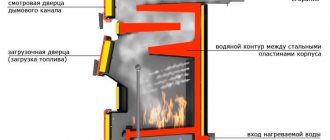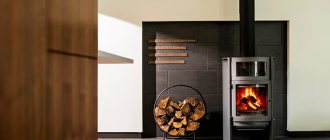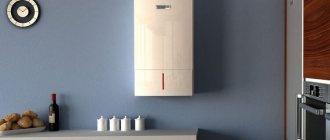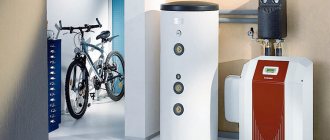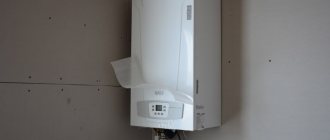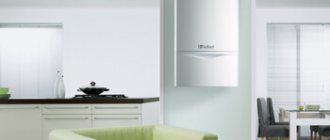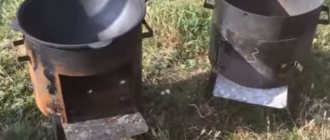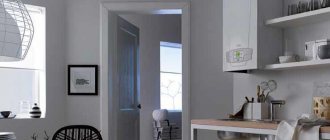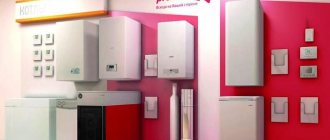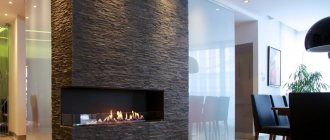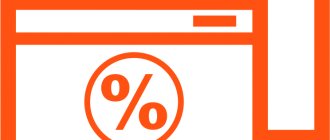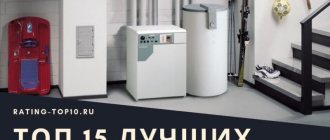A gas cast iron boiler is a boiler that runs on natural gas. Based on the parameters of the room, as well as the individual characteristics of the system, it is necessary to choose cast iron heating boilers with fan or atmospheric burners. It is also worth paying attention to automatic safety systems, choosing between volatile (electrically controlled) and non-volatile (pneumatic). The disadvantage of gas cast iron boilers is that they can only be used if there is a central gas pipeline or connection to liquefied gas. The water-heating gas boiler is widespread due to the high level of heat capacity of cast iron - it is capable of heating 200-2500 m2 of area.
A cast iron solid fuel boiler, without a central gas pipeline, is a pretty good option for building a heating system. Cast iron solid fuel boilers can heat from 250 m2 to 4000 m2, and the boiler’s operating life with proper water treatment can reach 50 years.
Boilers with a cast iron heat exchanger produced by BKMZlit are sectional, which greatly simplifies and reduces the cost of their repair. You will have to buy only the required number of sections, and not a whole heat exchanger for the boiler. By purchasing a cast iron floor heating boiler, you don’t have to worry about its reliability, durability and quality. With our products, your home will always be warm and cozy.
We offer to buy a cast iron boiler at an affordable price - call us to clarify all the details.
Net power (coal), kW: 26.5 Net power (firewood), kW: 24
Net power (coal), kW: 41 Net power (firewood), kW: 37
Heated area 150 m2 Chimney diameter 150 mm
Net power (coal), kW: 21 Net power (firewood), kW: 18.5
Net power (coal), kW: 32.5 Net power (firewood), kW: 29
Types and brief description
The devices differ in several features that you should pay attention to before purchasing.
Some boilers are not suitable for the type of power supply, others for the design.
Type of fuel
The heat source for solid fuel appliances is most often coal, wood or peat.
Fuel must be added every 4-8 hours, excluding long-burning models; adding firewood depends on the power, combustion mode and area to be heated.
Some devices are equipped with an additional thermometer, an auto-ignition system and a control panel.
Principle of fuel combustion
Pyrolysis - the basis of the device is the generation of heat by combustion of gas. Gas is extracted from wood by dry distillation from 600 to 800 degrees Celsius.
Water is heated by burning gas, which is produced by pyrolysis . This type of boiler has an increased efficiency of up to 91%. When operating such models, there is practically no emission of ash and soot.
Traditional - use heat from the combustion of filling material . Modern models use the top combustion technique, which ensures that each fuel burns alternately. Because of this, the amount of ash is reduced and efficiency increases to 80%.
Energy dependence
Volatile devices are devices that require power from the mains to regulate heating, temperature, ventilation and pump adjustment.
Non-volatile - these boilers do not require additional power sources . All control of temperature control, smoke removal, and water circulation is carried out mechanically.
Types of cast iron boilers
The modern Russian market of climate control equipment is represented by the following devices: traditional volatile and non-volatile models, pyrolysis units and long-burning cast iron boilers.
Coal fired boilers
The combustion principle of traditional coal boilers is similar to the operation of a conventional stove or potbelly stove. Today, the best use of this device is a sauna boiler. Fuel is loaded into the combustion chamber and ignited manually.
The combustion process invariably proceeds from the bottom up. Thermal energy from flue gases generated during fuel combustion is transmitted through cast-iron heating surfaces, usually made in the form of a water jacket.
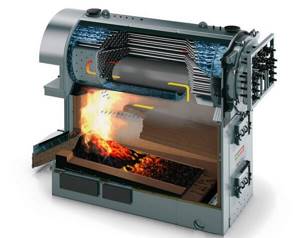
More modern high-tech modifications are equipped with an automation and control unit for combustion processes, which makes it possible to guarantee stable operation of the heating system within the established range.
The approximate duration of the thermal cycle on one load is from 2 to 4 hours. The efficiency of such coal units is low - from 72 to 80%. The only advantage of these traditional heaters is their relatively low price.
Pellet boilers
This is modern energy-efficient heating equipment designed for burning pellets. The basic structural elements of such a solid fuel cast iron boiler are: combustion chamber, burner device, pellet hopper. As well as an automation and regulation unit.
The pellets flow through the first auger in the fuel supply system into the pre-firebox, and from it through the internal auger to the burner device. The boiler has an automatic nozzle ignition system that ensures complete combustion of fuel. Calorific value 1 kg of pellets can generate 5 kW/hour of thermal energy
Units of this modification are characterized by high efficiency up to 92%. Pellets are stored in a fuel hopper combined with a combustion chamber. Their feeding into the furnace is fully automated with a period of uninterrupted operation of at least 7 days.
Long burning stoves
The long-burning boiler is capable of operating on various types of energy carriers: coal, briquettes, wood waste and peat fuel.
In contrast to traditional units, in which the thermal cycle of one load does not exceed 4 hours, a long-burning unit with wood can operate from 8 to 24 hours without additional loading, and with coal for up to 5 days.
An increase in operating life can be achieved by using higher calorie fuel, increasing the combustion volume and using the principle of top combustion of fuel.
The thermal energy of the boilers is generated evenly, which allows it to be completely transferred and stored in the network, even without installing a storage tank.
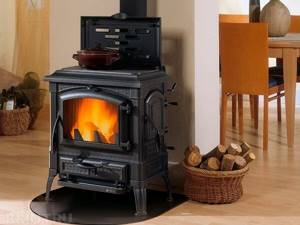
When the set temperature is reached in the heating circuit and inside the room, the intensity of the combustion process decreases due to the dosed air supply, in this case the boiler goes into temperature maintenance mode, reducing fuel consumption, and thereby extending the operating time. The efficiency of this heating principle reaches an efficiency of 92%.
Heat generators
Cast iron heat generators are units that generate thermal energy using natural energy sources for heating, usually large industrial premises. The coolant for such devices is not water, as in heating boilers, but air.
The heat generator in the combustion chamber burns fuel, resulting in the formation of flue gases that are emitted into the chimney, having previously passed through a system of cast iron heat exchangers.
Cold air moves inside the cast iron elements, which is taken from the room by a fan. The air is heated to a temperature of 140 C and supplied to the air flow distribution system, through which it enters the desired room.
How to choose and what to pay attention to
Type of fuel
If the client prefers coal when choosing fuel, then it is better to choose a boiler and steel . If firewood is used as fuel, then a cast iron model would be the best choice.
Power
This criterion determines how much area the device will be able to heat and how often it is necessary to add fuel.
NOTE!
For a large room and a two-story private house, a boiler with a capacity of 20-36 kW is suitable.
And for a small country house 14 kW is enough.
Weight and cost
The large weight and dimensions will cause inconvenience if the client does not have a special place to place the boiler.
Heavy weight also means higher installation and shipping costs . In addition, heavy boilers are much more expensive than lighter models.
Economical
The coefficient of a cast iron boiler is lower than that of a steel boiler. But a cast iron boiler takes longer to cool, thereby retaining heat for a longer time.
The time interval between fuel additions depends on the combustion time . Thus, economical cast iron models can keep warm all night.
Durability of the design
The default lifespan of equipment is about 10 years. But this depends on the careful handling of the owner and the quality of the materials from which the boiler is made.
If you choose a model with good materials, reliable assembly and properly care for the heating equipment, the device will last longer.
Safety
The equipment may become hot, creating a risk of burns.
Modern devices are equipped with a special layer of protection, and the walls of such devices do not heat up . In addition, protection is used on the door handles and a control panel is connected.
Comparison of steel and cast iron boilers
Comparison of two types of boilers must be carried out according to actual operating conditions and heat load.
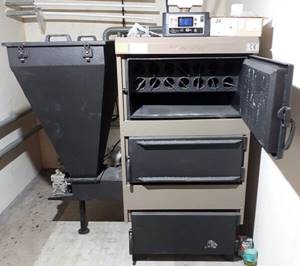
Kentatsu boiler
The following indicators are used for comparison:
- Dimensions, they are limited by the placement conditions at a particular facility; here, the best performance is found in cast iron modifications, which are much more compact.
- Weight is the best indicator for steel boilers, especially gas boilers, due to which they can be wall-mounted.
- Cost is an advantage for steel options.
- Service life is an advantage for cast iron units: 50 years versus 20 for steel boilers.
- Corrosion resistance is an advantage for cast iron devices; in fact, this parameter affects the service life of the units.
- Resistance to temperature changes and water hammer is an advantage for steel boilers.
Popular manufacturing companies
There are several reputable manufacturers that are preferred by clients:
- Stropuva - a Lithuanian brand that provides longer burning from one load of firewood. It has an interesting barrel-shaped design, which makes it possible to install the device in a small room. Lithuanian devices are quite expensive, but they are durable.
- Zota - for those who like to use firewood as fuel, the Russian brand is suitable. The devices are small in size and low in power. But they are also reliably constructed and affordable.
- Burzhuy-K is a Russian company that produces boilers independent of power supply, operating on pyrolysis. The cost of boilers varies from 40,000 to 76,000 rubles. The boilers have high power and retain heat for a long time.
The best classic solid fuel boilers
Kentatsu ELEGANT-03 17 kW
Kentatsu ELEGANT-03 17 kW
Stylish brown steel solid fuel boiler. Power 17 kW, suitable for heating a room of 170 sq.m.
Quite a reliable design from a Japanese manufacturer, provides uniform heating of the room.
Copes well with harsh winters.
Characteristics:
- appliance type - solid fuel boiler;
- contours - single-circuit;
- power - 17 kW;
- placement - floor;
- energy independence - yes;
- control - mechanical;
- combustion chamber - open;
- body material - cast iron;
- fuel - coal, firewood;
- pressure - 4 bar;
- dimensions - 450*947*609 mm;
- boiler weight - 166 kg;
- price - 35950 rubles.
Advantages:
- uniform heating;
- cast iron material;
- reliable design;
- easy controls;
- spacious firebox;
- interesting design.
Flaws:
- heavy weight;
- high price;
- no additional features.
Protherm Beaver 50 DLO 39 kW
Protherm Beaver 50 DLO 39 kW
Solid fuel boiler made of cast iron material 39 kW. The heat is enough to heat a private home. It has a spacious firebox for wood and coal.
Unfortunately, it does not work on other types of fuel - natural gas or pellets.
For the convenience of the client, a thermometer and pressure gauge are built in.
Characteristics:
- unit - heating boiler;
- type of fuel - wood, coal;
- number of circuits - one;
- power - 39 kW;
- energy independence - yes;
- installation - floor;
- control - mechanics;
- combustion chamber - open;
- body material - cast iron;
- Efficiency - 90.2%;
- pressure - 4 bar;
- thermometer - yes;
- dimensions - 440*935*1040 mm;
- boiler weight - 380 kg;
- 92717 rubles.
Advantages:
- quality materials;
- cast iron doors;
- high power;
- 8 heat exchanger sections;
- uniform heating.
Flaws:
- heavy weight;
- high price;
- bulky;
- the bottom of the boiler heats up;
- It is possible to use only wood and coal.
Teplodar Cooper Praktik 8
Teplodar Cooper Praktik 8
Steel solid fuel boiler from the Russian manufacturer Teplodar, with a capacity of 8 kW. Heats a small room of 80 square meters.
Suitable for a country house or garage.
Characteristics:
- unit type - solid fuel boiler;
- contours - single-circuit;
- power - 8 kW;
- area - 80 sq.m;
- installation - floor;
- energy independence - yes;
- control - mechanical;
- material - steel;
- Heating element - preinstalled;
- fuel - firewood, coal, peat briquettes;
- functions - thermometer;
- connection of external control - yes;
- boiler weight - 60 kg;
- cost - 12,460 rubles.
Advantages:
- affordable price;
- uniform heat;
- various fuels;
- compact size and light weight;
- easy control.
Flaws:
- the power is not enough to heat a two-story house;
- The housing may become hot.
Teplodar Cooper Praktik 14 14
Teplodar Cooper Praktik 14 14
Classic solid fuel boiler from the Teplodar company with a capacity of 14 kW. Suitable for heating a country house up to 140 square meters.
Installed on the floor.
Characteristics:
- appliance - solid fuel boiler;
- contours - single-circuit;
- thermal power - 14 kW;
- heating area - 140 sq.m.;
- installation - floor;
- control - mechanics;
- non-volatile - yes;
- material - steel;
- Heating element - preinstalled;
- fuel - coal, peat briquettes, firewood;
- thermometer - yes;
- dimensions - 420*655*630 mm;
- boiler weight - 68 kg;
- cost - 15,745 rubles.
Advantages:
- low price;
- compact dimensions;
- a light weight;
- quality materials;
- good heating of the room;
- spacious firebox for storing fuel.
Flaws:
- firewood burns quickly;
- before going to bed you need to add fuel.
ZOTA Box 8 8 kW
ZOTA Box 8 8 kW
Solid fuel heating unit with a power of only 8 kW. Suitable for a small room - a garage, country house or workshop.
The small appliance is equipped with a hob on which you can heat water or food.
Characteristics:
- boiler type - solid fuel;
- contours - single-circuit;
- power - 8 kW;
- placement - floor;
- energy independence - yes;
- control - mechanics;
- combustion chamber - open;
- Efficiency - 70%;
- material - steel;
- hob - yes;
- Heating element - optional;
- fuel - coal and firewood;
- thermometer - yes;
- dimensions - 380*460*630 mm;
- boiler weight - 71 kg;
- cost - 16,100 rubles.
Advantages:
- compactness;
- low cost;
- presence of a hob;
- quickly warms up a small room;
- economical fuel consumption.
Flaws:
- low power;
- at night it is necessary to throw it up.
Lemax Forward-20
Lemax Forward-20
A stylish solid fuel device with a power of 20 kW for heating a room of 200 m2. It features a spacious firebox located on the top panel.
Can be connected to a water heating system. Heats evenly and maintains temperature well.
Characteristics:
- appliance - heating boiler;
- fuel - solid: firewood, coal, coke;
- contours - single-circuit;
- power - 20 kW;
- non-volatile - yes;
- combustion chamber - open;
- Efficiency - 75%;
- control - mechanical;
- installation - floor;
- material - steel;
- thermometer - yes;
- boiler weight - 78 kg;
- fuel loading - vertical;
- cost - 19970 rubles.
Advantages:
- works on any solid fuel;
- quality steel;
- convenient top fuel loading;
- compact dimensions;
- environmental friendliness.
Flaws:
- firewood burns quickly;
- at night it is necessary to throw it up.
ZOTA Topol M 14 14 kW
ZOTA Topol M 14 14 kW
A bright solid fuel unit with a power of 14 kW for heating a room with a maximum area of 140 m2. It is possible to install a heating element to maintain the room temperature.
Characteristics:
- unit - heating boiler;
- contours - single-circuit;
- power - 14 kW;
- heated area - 140 m2;
- placement - floor;
- energy independence - yes;
- control - mechanics;
- combustion chamber - open;
- Heating element - optional;
- fuel - coal, firewood;
- thermometer - yes;
- boiler weight - 113 kg;
- cost - 14391 rubles.
Advantages:
- compact dimensions;
- sufficient power;
- the ability to connect a heating element;
- holds heat well;
- acceptable cost.
Flaws:
- firewood burns quickly;
- the walls heat up;
- no additional features.
Protherm Beaver 20 DLO 19 kW
Protherm Beaver 20 DLO 19 kW
A high-quality unit made of cast iron material with a power of 19 kW. Suitable for heating a private house with an area of 190 m2.
The heat exchanger includes 4 sections.
Characteristics:
- type of device - solid fuel boiler;
- number of circuits - one;
- power - 19 kW;
- area - 190 square meters;
- placement - floor;
- energy independence - yes;
- control - mechanical;
- material - cast iron;
- fuel - coal, firewood;
- thermometer - yes;
- dimensions - 440*935*640 mm;
- boiler weight - 230 kg;
- cost - 52,000 rubles.
Advantages:
- simple controls;
- reliable design;
- large ash pan;
- straight seams;
- good painting;
Flaws:
- high price;
- Not very roomy firebox.
Lemax Forward-12.5 13 kW
Lemax Forward-12.5 13 kW
An almost silent solid fuel unit with a power of 13 kW for heating an area of 130 m2. Compact dimensions allow the device to be installed in a small room.
The power is enough to heat a country house.
Characteristics:
- device - solid fuel;
- number of circuits - single-circuit;
- power - 13 kW;
- placement - floor;
- energy independence - yes;
- control - mechanics;
- combustion chamber - open;
- Efficiency - 75%;
- material - steel;
- thermometer - yes;
- fuel loading - vertical;
- boiler weight - 70 kg;
- cost - 14960 rubles.
Advantages:
- fast heating;
- compactness;
- reliable assembly;
- works silently;
- low cost;
- decent power.
Flaws:
- when laying coal there is a lot of dirt around;
- inconvenient to clean.
Lemax Forward-16 17 kW
Lemax Forward-16 17 kW
A variation of the previous model, but with increased power to 17 kW. It consumes fuel quite economically. Warms up a private home well.
Features reliable build quality.
It works silently.
Characteristics:
- unit - boiler;
- fuel - coal, firewood, coke;
- number of circuits - one;
- power - 17 kW;
- area - 170 m2;
- installation - floor;
- non-volatile - yes;
- control - mechanics;
- combustion chamber - open;
- Efficiency - 75%;
- thermometer - yes;
- boiler weight - 73 kg;
- price - 16,500 rubles.
Advantages:
- low noise level;
- uses fuel economically;
- environmentally friendly;
- safe;
- vertical loading of firewood;
- convenient use.
Flaws:
- non-standard chimney diameter.
Let's sum it up
Solid fuel appliances steadily occupy one of the consumer niches among heating equipment. The wide technological capabilities possessed by the new models have brought heating devices made of cast iron to a new level.
Today, solid fuel units made of cast iron are becoming a mandatory attribute of a country house. The omnivorous nature of heating devices in terms of fuel, unpretentiousness in maintenance, and simplicity of design make these devices competitive products in the heating equipment market. The high cost of products should not confuse the consumer. The invested funds will pay off in full, taking into account the service life of the boiler equipment.
The best long-burning solid fuel boilers
Stropuva Mini S8 8 kW
Stropuva Mini S8 8 kW
Bright solid fuel boiler with a safety valve, power 8 kW. Suitable for heating a room of 80 m2. The fuel burns for up to twenty hours, the temperature is enough for the whole night.
Characteristics:
- type of device - solid fuel boiler;
- type of combustion - long;
- contours - single-circuit;
- power - 8 kW;
- area - 80 m2;
- placement - floor;
- energy independence - yes;
- control - mechanics;
- combustion chamber - open;
- fuel - firewood, wood briquettes;
- safety valve - yes;
- thermometer - yes;
- boiler weight - 145 kg;
- price - 53,000 rubles.
Advantages:
- compactness;
- long burning;
- ease of use;
- reliable handles;
- does not require power supply;
- robust design.
Flaws:
- high price;
- heavy weight;
- it is difficult to wash off carbon deposits from the cladding;
- Not very convenient for loading firewood.
ZOTA Topol-22VK 22 kW
ZOTA Topol-22VK 22 kW
A high-quality solid fuel device with a power of 22 kW, which is enough to heat an area of 220 m2. Convenient loading consists of two sections for storing firewood.
Characteristics:
- appliance - solid fuel boiler;
- contours - single-circuit;
- power - 22 kW;
- placement - floor;
- control - without control panel;
- fuel - coal, coal briquettes, firewood, wood briquettes;
- thermometer - yes;
- boiler weight - 128 kg;
- price - 36,860 rubles.
Advantages:
- various types of fuel;
- long burning;
- economical consumption;
- convenient operation;
- reliable design.
Flaws:
- heavy weight;
- no control panel.
ZOTA Topol-16VK 16 kW
ZOTA Topol-16VK 16 kW
A decent model of a solid fuel boiler with two sections for storing fuel. Designed for heating a small private house or workshop of 160 m2.
Ensures long burning of wood or coal.
Options:
- unit - heating boiler;
- fuel - coal, firewood, coal and wood briquettes;
- power - 16 kW;
- placement - floor;
- control - without control panel;
- Efficiency - 75%;
- thermometer - yes;
- boiler weight - 108 kg;
- cost - 30,100 rubles.
Advantages:
- heats up quickly;
- gives uniform heat;
- quality materials;
- long burning;
- possibility of laying briquettes;
- easy control.
Flaws:
- high price;
- heavy weight;
- no control panel.
ZOTA Topol-32VK 32 kW
ZOTA Topol-32VK 32 kW
Reliable solid fuel unit with a power of up to 32 kW. Capable of heating an area of 320 square meters. It is possible to install an additional heating element and connect external control.
Excellent for a country house, ensures long burning of fuel.
Characteristics:
- type of device - solid fuel boiler;
- number of circuits - one;
- power - 32 kW;
- area - 320 m2;
- installation - floor;
- energy independence - yes;
- control - mechanics;
- Efficiency - 75%;
- fuel - coal, coal briquettes, wood briquettes, firewood;
- thermometer - yes;
- connection of external control - yes;
- boiler weight - 143 kg;
- price - 40,370 rubles.
Advantages:
- fast heating;
- reliable assembly;
- simple controls;
- opportunity to purchase a burner;
- economical fuel consumption;
- stylish design.
Flaws:
- heavy weight;
- high price.
Stropuva S30 30 kW
Stropuva S30 30 kW
A full-fledged solid fuel boiler with a power of 30 kW for heating a room of 300 m2. Equipped with thermometer and safety valve.
Made of high quality steel, the material does not become red-hot when the boiler heats up.
The only boiler that continues burning for up to 31 hours.
Characteristics:
- appliance - solid fuel boiler;
- power - 30 kW;
- area - 300 sq.m.;
- placement - floor;
- control - mechanical;
- contours - one;
- non-volatile - yes;
- combustion chamber - open;
- Efficiency - 85%;
- material - steel;
- fuel - firewood, wood briquettes;
- thermometer - yes;
- safety valve - yes;
- boiler weight - 257;
- price - 89,800 rubles.
Advantages:
- long burning;
- uniform heat;
- fast heating;
- quality materials;
- presence of a thermometer;
- economical fuel consumption.
Flaws:
- high price;
- heavy weight;
- bulky.
Advantages and disadvantages
Before choosing a boiler for an autonomous boiler system, you should weigh the pros and cons. Each type of heating device has its own advantages and disadvantages. Solid fuel boilers made of cast iron also have their advantages and their obvious disadvantages.
We have already said that heating equipment of this kind is very inert and difficult to adjust. It takes a long time for the boiler to cool down. When installing the device in a heating system, it is necessary to install an expansion tank, which acts as a temperature regulator of the coolant in the circuit.
A significant drawback, if the operating conditions are not met, for this heating equipment is the fragility of the cast iron heat exchanger. Such units suffer greatly from mechanical damage, sudden temperature changes and water hammer.
Important! When transporting the new boiler, care must be taken to avoid impacts or falls.
*
Damage to the heat exchanger can be avoided if you follow the operating rules. Do not load cold firewood into the firebox or fill the device system with cold water. For reliability, you can install mixing units that act as a mixture.
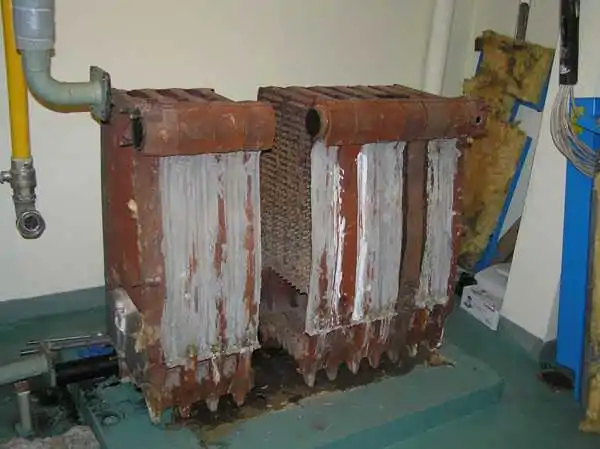
In technological terms, heating devices with cast iron heat exchangers are significantly inferior to gas units and other types of solid fuel equipment in terms of thermal efficiency.
Compared to steel appliances, heating appliances made of cast iron are more expensive. However, you should not bring all the listed factors together and give up on equipment of this type. The advantages of this technique are obvious:
- long service life;
- high resistance to corrosion processes;
- absence of scale inside the heat exchanger;
- maintainability and manufacturability of the boiler design itself;
- acceptable dimensions of equipment corresponding to living conditions;
- high resistance to electrochemical reactions and to sharp drops in boiler water temperature.
The best pyrolysis boilers
TRAYAN T15 15 kW
TRAYAN T15 15 kW
Model of a pyrolysis boiler from a Russian manufacturer using solid fuel. Made of high quality steel, the material does not heat up and is easier to clean than cast iron models.
After prolonged use, the paint may peel off.
Options:
- boiler type - solid fuel;
- type - pyrolysis;
- thermal power - 15 kW;
- heated area - 160 m2;
- installation - floor;
- energy independence - yes;
- control - mechanical;
- Efficiency - 85%;
- fuel - firewood, coal;
- boiler weight - 230 kg;
- pressure - 95%;
- price - 44370 rubles.
Advantages:
- low noise level;
- uniform heating of the room;
- heats up quickly;
- reliable assembly;
- quality material;
- good paint job.
Flaws:
- high price;
- heavy weight.
Bourgeois-K MODERN-12 12 kW
Bourgeois-K MODERN-12 12 kW
Solid fuel boiler of rich bright color, made of high quality steel. A power of 12 kW is enough to heat a room of 120 m2.
Works on wood, coal, peat briquettes.
Suitable for a country house or workshop.
Options:
- type - boiler;
- fuel - firewood, coal, wood briquettes, peat;
- number of circuits - single-circuit;
- power - 12 kW;
- heated area - 120 m2;
- combustion chamber - open;
- Efficiency - 92%;
- control - mechanical;
- installation - floor;
- thermometer, pressure gauge - yes;
- boiler weight - 220 kg;
- dimensions - 400*1070*780 mm;
- cost - 59,900 rubles.
Advantages:
- ability to use a variety of fuels;
- high efficiency;
- presence of a thermometer;
- stylish design;
- adequately warms the room;
Flaws:
- overcharge;
- heavy weight;
- inconvenient ash pit.
Bourgeois-K MODERN-24 24 kW
Bourgeois-K MODERN-24 24 kW
A solid fuel boiler from Russian manufacturers with a power of 24 kW, which is enough to heat a private country house with an area of 250 m2.
The device is installed on the floor and runs on solid fuel.
Characteristics:
- type - solid fuel boiler;
- number of circuits - single-circuit;
- thermal power - 24 kW№
- heating area - 250 m2;
- installation - floor;
- non-volatile - yes;
- control - mechanics;
- fuel - coal, firewood, pellets, wood briquettes, peat;
- maximum pressure - 4.5 bar;
- thermometer - yes;
- pressure gauge - yes;
- dimensions - 500*1180*800 mm;
- boiler weight - 310 kg;
- cost - 76,050 rubles.
Advantages:
- high power;
- convenient control;
- The ash pan is easy to clean;
- quality materials;
- reliable assembly.
Flaws:
- high price;
- heavy weight;
- bulky.
TRAYAN T20 20 kW
TRAYAN T20 20 kW
Solid fuel boiler with a capacity of 20 kW for heating private houses, workshops and other premises. It is heated with coal and wood.
Installation is carried out on the floor, on special legs.
Thick steel ensures the durability of the device.
Characteristics:
- device type - solid fuel boiler;
- contours - one;
- maximum power - 20 kW;
- area - 220 sq.m.;
- installation - floor;
- energy independence - yes;
- control - mechanics;
- combustion chamber - open;
- fuel - firewood, coal;
- functions - thermometer, pressure gauge;
- dimensions - 460*980*760 mm;
- boiler weight - 260 kg;
- price - 51990 rubles.
Advantages:
- fast heating;
- long burning of fuel;
- the manufacturer promptly responds to customer questions;
- ease of use;
- durable materials.
Flaws:
- high price;
- heavy weight;
- bulky;
- small firebox.
What are cast iron solid fuel boilers?
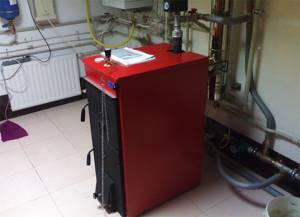
The main distinguishing property of cast iron models is the resistance of cast iron to corrosion. Steel heat exchangers have not so thick walls, the resource of which is simply limited by the physical properties of the metal. After 12-15 years, the metal is destroyed and the heat exchanger leaks. The situation can be slightly improved only by using purified and softened coolant.
Cast iron heat exchangers have thicker walls, and the metal does not corrode; after many years it can only be slightly covered with a rusty crust on the outside. Therefore, their service life when using any coolant is over 30 years.
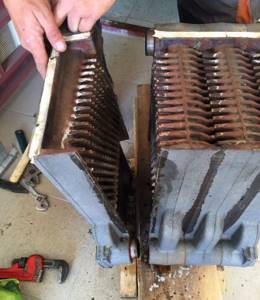
Only light rust inside the cast iron heat exchanger sections after over 7 years of use.
However, there are many known disadvantages: first of all, fragility. It is necessary to transport and install cast iron boilers with extreme caution; even minor mechanical damage can lead to cracks or destruction of sections. The situation is aggravated by the huge weight of such models - on average 150-220 kg, versions with a power of 40 kW or more can weigh over 300 and even 400 kg.
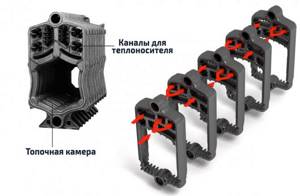
The cast iron heat exchanger consists of sections firmly connected to each other. The boiler power depends on the number of sections. Unlike solid steel, a damaged section of a cast iron heat exchanger can be easily replaced.
Fragility also manifests itself in sensitivity to sudden temperature changes, for example, a large difference between the supply and return lines. In addition to carefully monitoring the temperature difference, the problem can be solved by installing a four-way mixing valve, through which a certain volume of heated coolant from the supply is mixed into the return line. To mitigate the above-described disadvantages, some leading manufacturers make the heat exchanger from more advanced alloys, for example, from gray cast iron alloys. However, the cost of such models is 20-50% higher.
The advantage and at the same time disadvantage of cast iron heat exchangers is their high inertness. Cast iron takes longer to heat up, but also continues to transfer thermal energy to the coolant much longer. However, it is impossible to precisely adjust the operation of the boiler or quickly change the desired temperature level.
In cast iron solid fuel boilers you can burn wood, coal, wood briquettes, pellets, and peat. Almost all models are capable of working on any type, however, there are also models whose design means working only on wood.
There are both single-circuit, intended only for heating, and double-circuit models, intended for heating and hot water supply to the house. The power of household cast iron boilers varies between 8-120 kW.
Long burning boilers
Separately, it is worth highlighting long-lasting models, in which the burning time of one load is 2-5 days. This result is achieved by increasing the volume of the firebox and a more economical top-down combustion principle.
Often, long-burning solid fuel cast iron boilers are more technologically advanced and can be equipped with advanced automation. Despite the cast iron heat exchanger, the body is often made of steel, which reduces the weight and cost of the boiler. However, such models still cost 1.5-2 times more.
Boilers with a burning duration of one load of fuel up to 7 days
